Wave pools signal mental and physical health boom beyond expensive coastal zipcodes
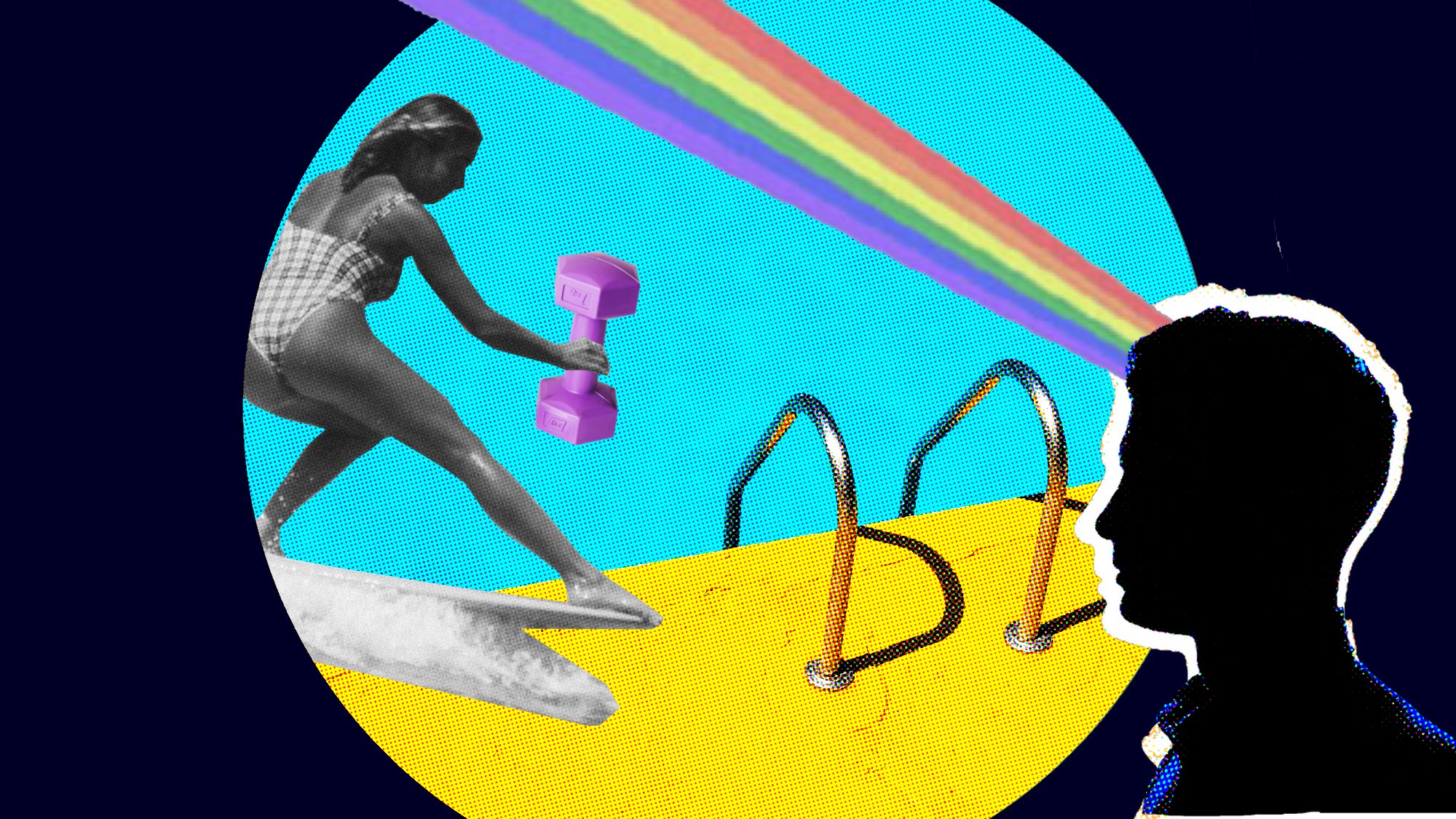
Does surfing make you a happier person? Yes. Salted surfers have known this all along. There are obvious exercise benefits, but more and more we see that surfing is good for mental health as well. Some call this Blue Health. And as wave pools push surfing beyond the world’s coastal borders, stoke and wellness are reaching the landlocked on global scale…
As the old saying goes, there are two kinds of people – those who love surfing, and those who’ve yet to try it.
For communities far from the ocean that are going to have wave pools built in their area, some folks there already know the stoke of riding waves. But for most of the residents, the whole appeal must be a bit of a mystery. It appears time and again with press releases and local articles once these projects are confirmed, lines like, “It’ll be great for the young people”, and “just what the youth need”. While this is true, it’s not the whole story. These statements can also entrench, in non-surf-aligned minds, that surfing is just for rubber-limbed young-uns.
A BMX track, skate ramp, sure, that’s pretty much a one-way ticket to the ER for anyone over 35. But surfing, when you fall, it’s a little more genteel, generally, it’s just your dignity getting a dunking. Surfing’s for everyone, and with easier access, thanks to wave pools, a whole new swathe of people, who were likely never to set foot on a surfboard can experience the thrill. Good for the body, good for the mind.
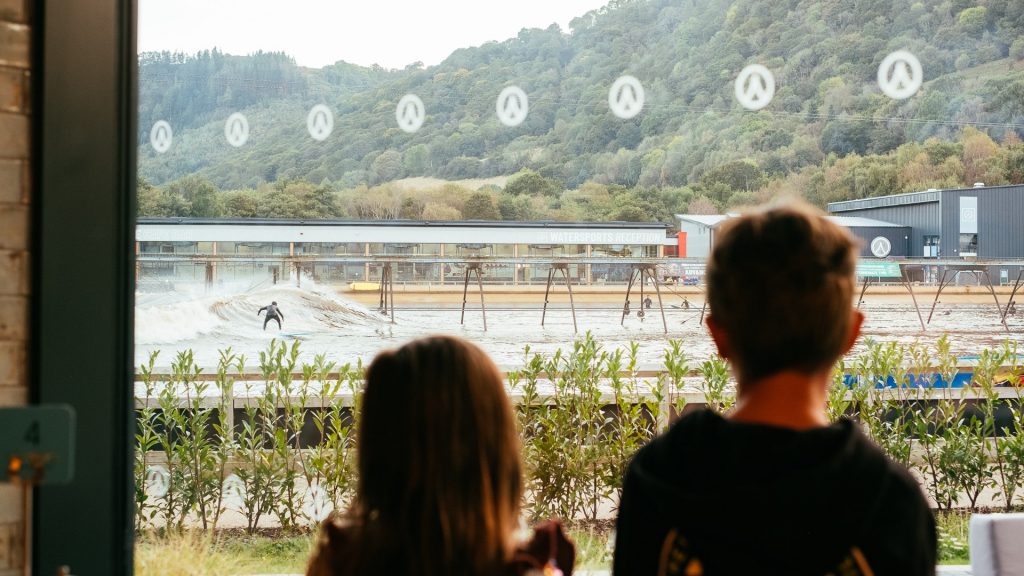
Mental Health
I had a chat with psychologist Brad Smallwood, about his thoughts on pools heading inland.
“From an emotional and mental well-being standpoint, any research points out that spending time in the water is tremendously beneficial,” says Brad. “While words like ‘being present’ and ‘mindful’ are often overused in the psychology community, it is the pursuit of learning and practicing these skills that help us learn how to slow down, better manage our anxiety, and cope with depression that’s common to our life experience.”
Brad notes that being in water and being one of the only mammals that cannot instinctively swim, whether it’s cold Northern California or a chlorinated pool in Florida, gives our minds and bodies no choice but to pay attention to our surroundings and focus on what is more immediate.
Having studied the field of psychology for close to 20 years, Brad’s heard countless (and maybe exaggerated) anecdotes from graduate school professors citing studies that the reason drug dealers in Central Park, New York gravitate towards fountains to do business is the pleasant experience of being near running water or that the reason humans like to look out over the water from a hill is that it gives them a sense of psychological advantage over potential attackers. Surfing-wise reckons Brad, it’s an escape from the world of buzzing phones and real day-to-day problems and using our bodies to paddle, move, and track down a wave that, once dropping into, you have no focus other than the wave in front of you.
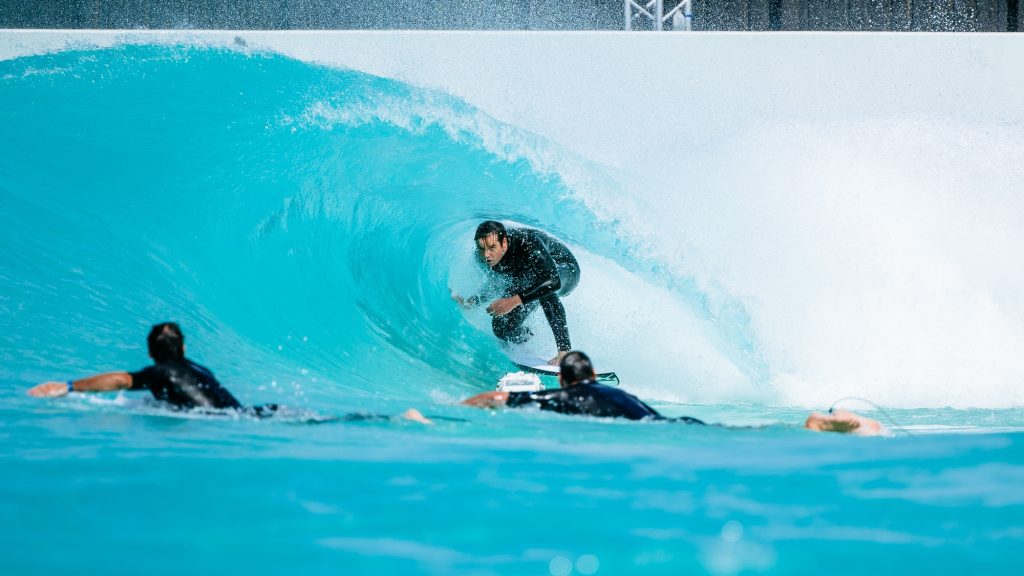
Having surfed in two separate wave pools, Brad believes the thrill is close enough to the experience of surfing in the ocean and that post-score feeling is almost parallel between environments. Many surfers will cite surfing as their escape from the stressors of daily life and some will say the ocean is their best friend or what raised them.
“With the expansion of surf pools into landlocked zones, what a seemingly incredible opportunity for the folks of those communities to be able to tap into the same mental wellbeing benefits that a person from Santa Cruz can enjoy,” said Brad.
His hope is that with the expansion of these pools, and the potential wellbeing that comes with it, is the ability to access this regardless of economics. The beach is free, wave pools cost money.
“It’s unclear how surfing stacks up against other activities from a mental health standpoint,” said Brad. “Jiu-Jitsu practitioners love the “chess game” of trying to sink in choke while simultaneously warding off opponent attacks. Hiking, yoga, and dozens of other outdoor activities are excellent for one’s mental wellbeing. However, surfing takes every single sensation working in harmony at all times just to catch a wave- from one foot to twenty. It’s hard to imagine another activity that can do that.”
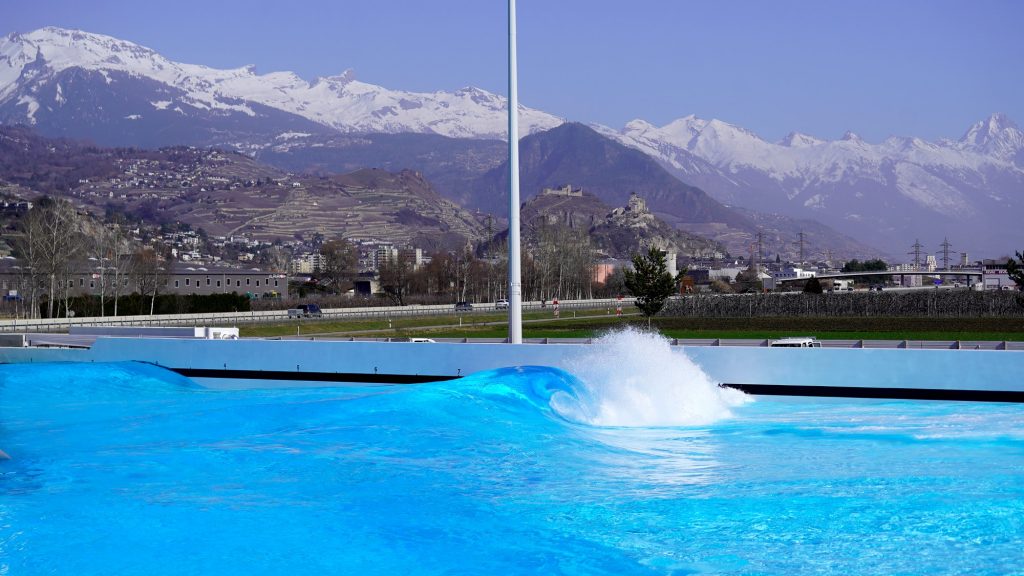
Moving Inland
David Hilts, president of the Coachella Valley Surf Club (an inland area in California that’s set to be home to 4 wave pools) has this to say about the pitfalls, passion, and the ‘surfer gym’ opportunities of pools far from the beach.
Being a surfer who lives 100 miles from the ocean has its challenges, says Dave. He’s blessed to have a small home in Oceanside where he can stay connected to surfing and his business allows him to work from any location. A landlocked surfer now has the advantage of Surfline, which is a double-edged sword. You can watch and stay connected but you can also see what you are missing, Dave acknowledges.
Dave reckons that in one way it’s an advantage living far from the ocean, it’s the anticipation of going surfing which keeps him motivated to stay in shape and keeps him stoked almost as much as when he was a kid.
“Now that our Coachella Valley is going to have four wave basins, it’s going to be a real game-changer,” said Dave. “Having this so close to home is going to be great because I can jump in the car, go surf for an hour and get a great workout and relieve the stress of not getting to the ocean, but still get to surf.”
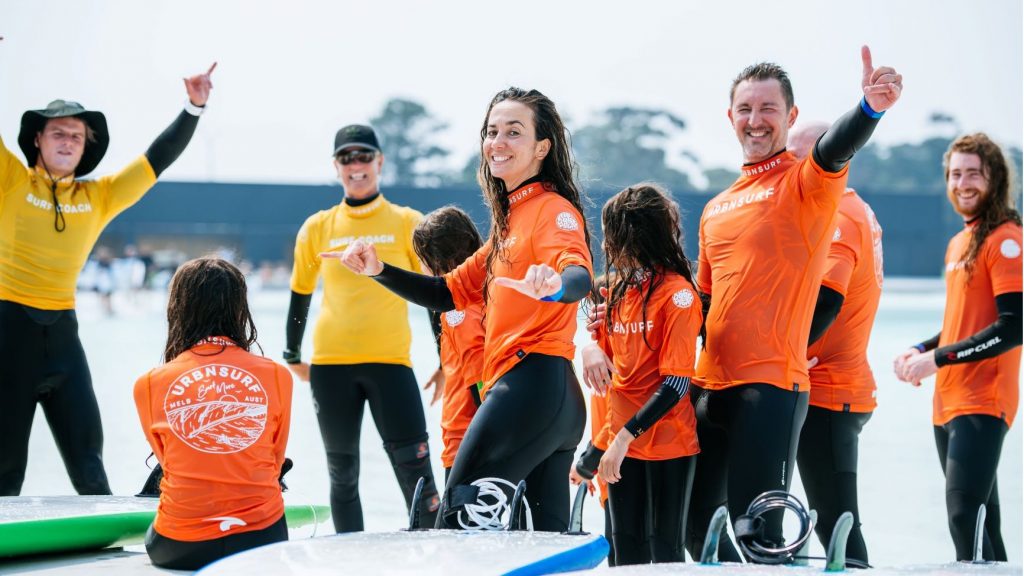
Denice Hilts (Dave’s wife) is a teacher and is involved with kids from low-income backgrounds. She believes the new pools are going to open up a whole new world of experiences for the kids and provide a boon for their mental health.
Denice regards one of the biggest challenges of teaching students who have grown up in generational poverty is getting them to experience life outside their homes. Most have never been to the ocean, mountains, or desert even though they are within driving distance. Whenever Denice mentions to any of her students that her husband surfed it was like she was talking about another planet, she reckons.
She points out that surfing has been used as therapy for veterans with PTSD, the handicapped, and those with mental health challenges. She’s amazed to see how self-confident and ecstatic students are after surfing for the first time.
“The wave pool movement in Coachella Valley is going to bring surfing to young people who otherwise would never have the opportunity to experience the thrill of riding a wave,” said Denice. “Fortunately, the wave pool representatives have been positive about letting the local high school students surf and possibly compete.”
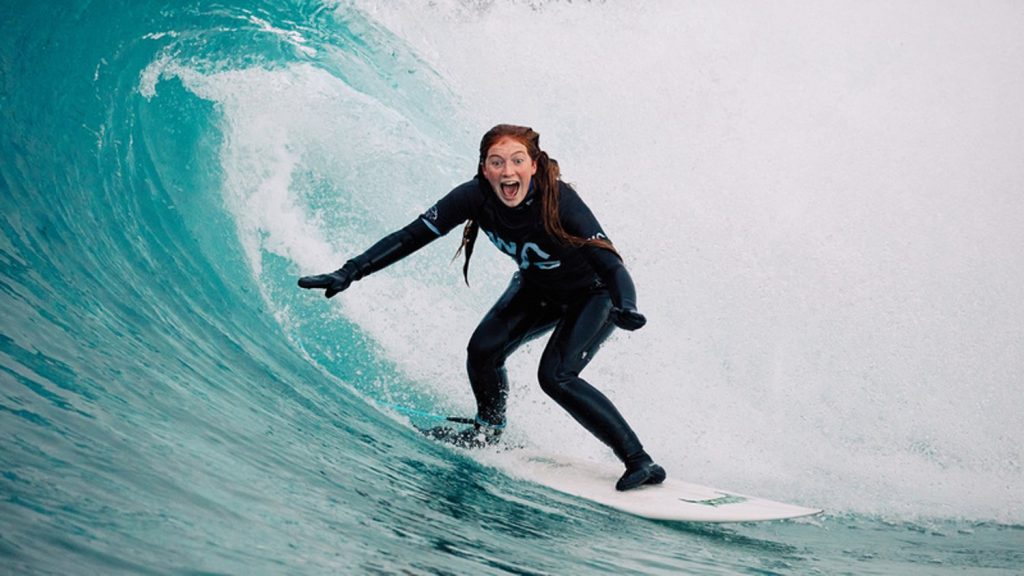
Blue Health – yes it’s a thing
Nick Hounsfield, Founder, and CVO of The Wave, in Bristol, England has been a long-time advocate for the mental health benefits of surfing. Often termed as ‘Blue Health’, Nick has many opinions on the topic.
For Nick, surfing has always been more than just a sport – it’s a culture, a way of life, his medicine, and his reset button. Whilst working in healthcare, it struck Nick how being around water and nature seemed to relieve some of the stress and anxiety his patients (Nick’s also an osteopath) were struggling with, and he wanted to find a way to give more people a chance to experience this. This was the catalyst to create The Wave.
“There is a growing body of scientific evidence showing that spending time in, on, or close to water is good for us,” said Nick. “Moreover how blue environments may help to tackle health challenges such as obesity, physical inactivity, and mental health disorders.”
Nick believes the evidence around the benefit of surfing for mental health and wellbeing is particularly compelling.
“Surfing and surf therapy is used to help people suffering from PTSD, low self-esteem, depression, trauma, and anxiety,” said Nick. “It builds confidence and resilience, makes people focus on the moment and be in a state of mindfulness – and being in a ‘flow start’ (as happens when you catch a wave) has been linked to a big increase in the impact of any therapy carried out straight afterward.”
Nick goes on to state that the work they’ve been doing with their charities such as The Wave Project, that’s using surf therapy to help children suffering from anxiety and poor mental health, is having fantastic results.
Taking part in any sports and physical activities has a positive impact on our mental health, says Nick, but it does appear that those carried out in a ‘blue’ environment seem to be ‘super-charged’ in terms of their benefits.
Related Coverage
